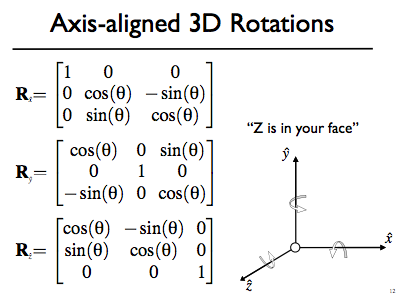Background: I'm helping engineers use software to create 3D geometry in a programmatic way (similar to OpenSCAD). The functions they need to call have inputs which are low-level geometry concepts: 3D vectors, coordinate systems, and rigid transforms. This comes very naturally to some, but others struggle; they may have learned these concepts back in high school or college, but they've since forgotten.
Unfortunately, most of the literature I see introduces these concepts too abstractly for someone to recognize what it means in a 3D context. Naturally, transforms are far more general than three dimensions allow, but seeing simple examples of rotations, translations, and scalings would immediately be helpful. Similarly, vectors are not always 3D, and coordinate systems are not always cartesian, but these cases lend themselves really well to visual, intuitive examples.
Are there resources (ideally free and online) that define and explain the concepts of 3D geometry primarily inside that context?
